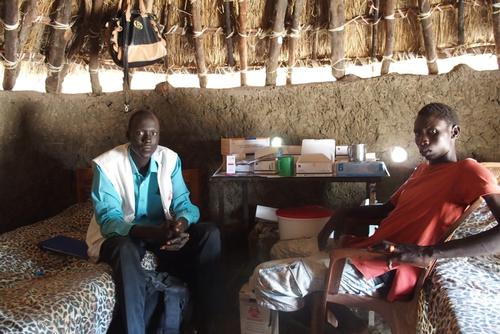Every morning the community health workers bring medication and medical equipment to the different villages. Motorbikes allow them to access remote places cars cannot reach.
An exceptionally severe malaria season is again hitting South Sudan and the Abyei Special Administrative Area, with a dramatic increase in cases. But with few health facilities in this remote area, people with severe malaria often end up dying quiet deaths in their villages. MSF is working with local communities to put an end to preventable illness and deaths, with a community-based test and treat programme to provide early malaria treatment for people living in distant rural areas.
MSF has set up a network of 37 ‘malaria agents’, supervised by six community health workers, to diagnose and treat malaria in 23 villages within a 30-km radius of the town of Agok. With the region’s poor roads becoming impassable to cars during the rainy season, the teams are using motorbikes to reach the villages.
Since the start of the programme in August, 19,411 people have received treatment in their villages after testing positive for malaria – an average of around 1,800 people per week. Of these, more than 160 were cases of severe malaria and were referred to MSF’s hospital in Agok for specialised treatment.
“Receiving treatment in their villages has been a game changer for people who before had to walk for several hours, and sometimes days, to get to the nearest health facility,” says MSF’s Jessa Pontevedra, who is managing the programme. “It has allowed us to treat many more people than we had expected, and it has also significantly reduced the numbers of cases of severe malaria, as people are being treated earlier.”
Earlier this year, MSF’s hospital was struggling to cope with the high numbers of patients admitted with severe malaria. “In June, we increased the number of beds from 125 to almost 200,” says MSF doctor Sabine Haller. “We put beds in the hallway, in the surgical ward and in four tents in the courtyard, but the hospital was still overflowing with severe malaria patients.” But since the start of MSF’s community-based programme, the percentage of severe cases has decreased, falling to 17 percent in September and October, compared to 23 percent at the same time last year.
In the village of Rumbekdil, malaria agent Donato and community health worker Valentino start preparing to receive patients. Donato opens up his own home every day to the members of his village who come to seek treatment for malaria.
Local communities have welcomed the new programme, and their active involvement has been key to its success. “This has helped us a lot,” says Kuol Deng, leader of Mijak Deng Kaya village. “Last year, we had to carry a lot of sick people to the hospital, and many of them died.”
Community leaders relay information to the villagers, help store the medication and equipment, and have built shelters where the malaria agents can carry out their work. Sometimes they also provide financial compensation or incentives to the malaria agents, who work on a purely voluntary basis.
The malaria agents take great pride in their work and say they can really see the difference it is making to their communities.
“People get treatment now, but last year there were many deaths, as people couldn’t go all the way to the hospital,” says Abraham, a malaria agent who lives and works in the village of Maibong. “Seeing all these deaths was terrible. This is why I wanted to help my community – so that fewer people would die.”




